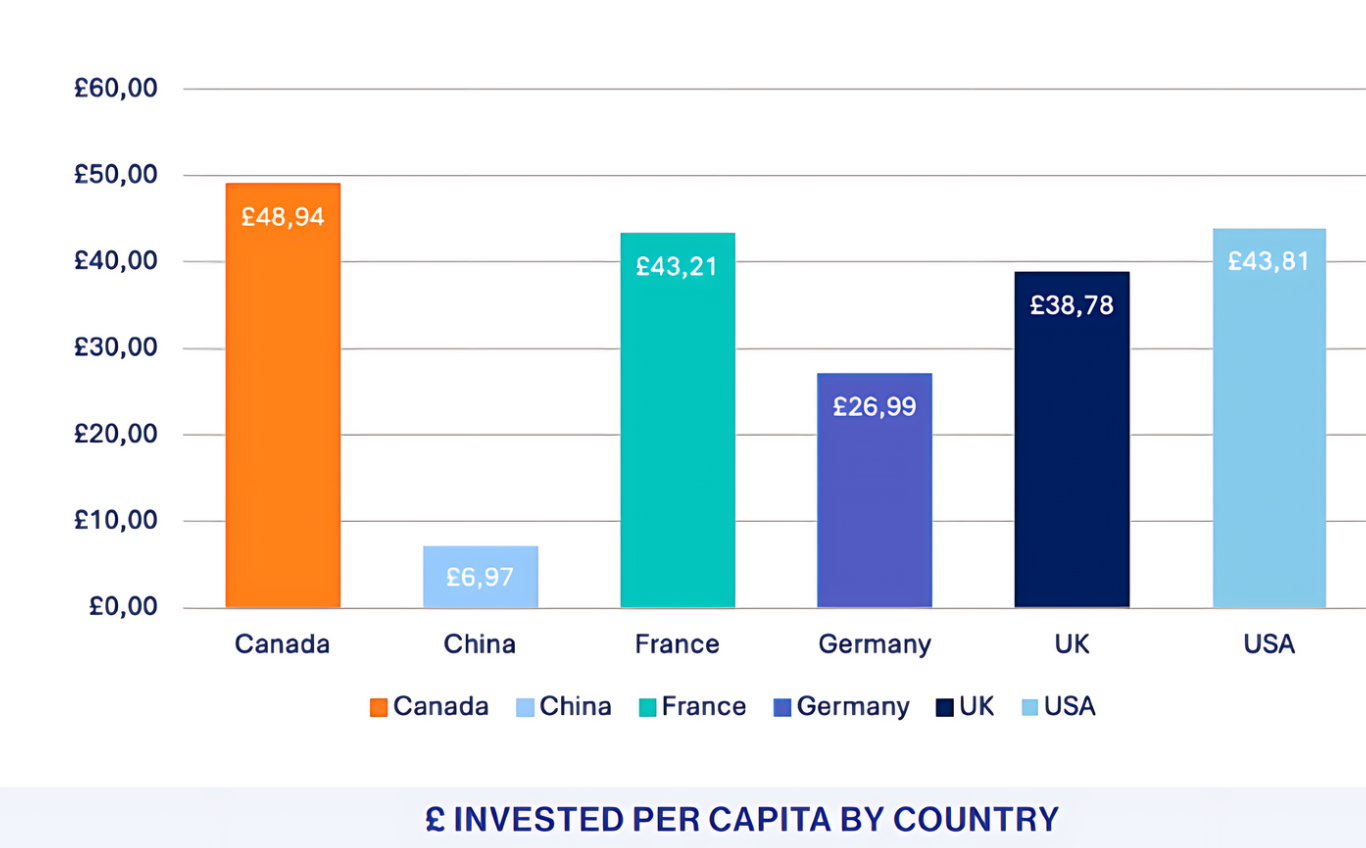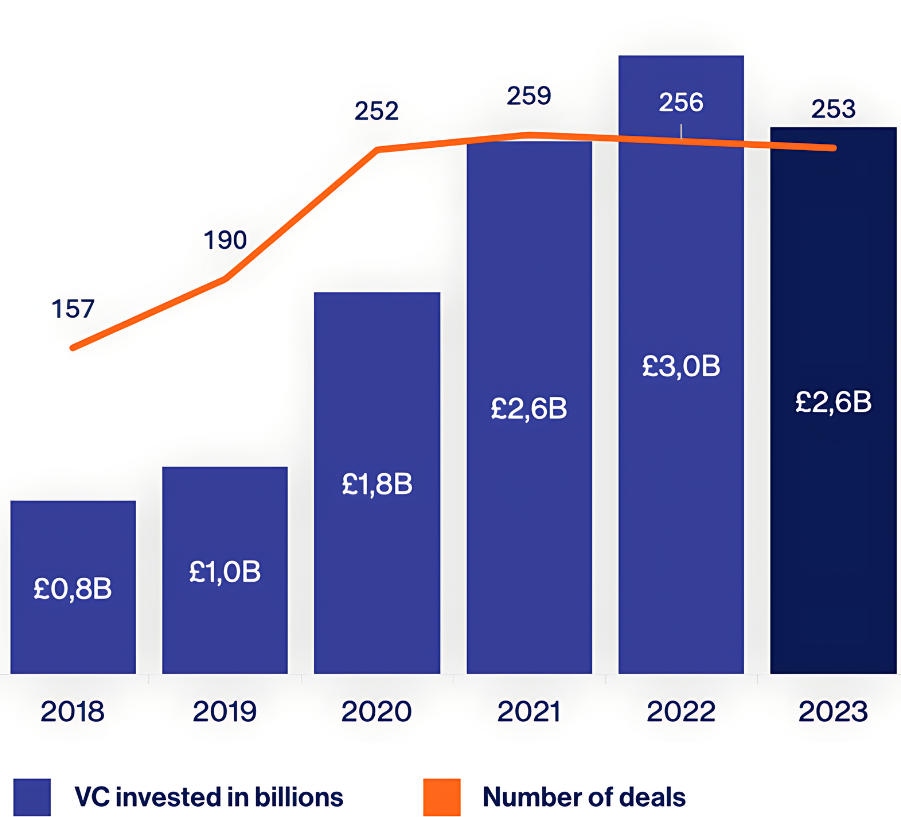How to unleash the UK’s cleantech industrial potential


· 5 min read
💡 This article is featured in The Definitive Reading List: illuminem’s Recommended Sustainability Classics
2023 was a year of global economic volatility – inflation, geopolitical uncertainty and rising interest rates. However, the UK’s economy persevered in the face of inflation and subdued growth. A beacon of hope in this daunting climate was the cleantech community.
According to proprietary Cleantech Group data, venture capital investment into clean technologies in the UK outperformed the general VC market downturn, and managed to stay level with 2021 – just slightly lower numbers than 2022. In total, the cleantech sector garnered £2.6 billion. Looking at investment per capita in the UK and comparable countries, the UK substantially outperformed Germany, but trails the US, France and global per capita leader in cleantech, Canada.


However, these investments are primarily at the early stage, in which companies are still developing their product concept. We continue to innovate at pace, but we are not deploying the technologies needed for net zero at scale. In fact, there’s a ‘valley of death’ facing cleantech innovators as they enter the critical ‘first-of-a-kind’ (FOAK) phase where innovators need to raise unprecedented volumes of cash, often in the hundreds of millions to put shovels in the ground and build their first commercial-scale factories.
Currently, British-borne companies struggle to raise this kind of capital in the country, and so must look abroad for funding. With tax credit schemes such as the Inflation Reduction Act in the United States, UK innovators face pressure to scale their tech out-of-country, meaning the jobs and tax revenues associated with their growth could leave with them.
CBI Economics have established that businesses involved in the net zero economy contributed £74 billion in Gross Value Added (GVA) in 2022-23, which is equivalent to 3.8% of the UK economy. They also establish that the net zero economy currently already supports 765,700 Full Time Equivalent jobs in the UK, which are on average better paid than the national average salary by almost £10,000 per year. Enabling cleantech deployment at scale could easily see these numbers skyrocketing. The subsequent jobs could easily make up the backbone of our future industrial base. This provides an opportunity to roll out well-paying jobs across the entire country.
Given the current challenging budgetary environment, the Government can only act as a catalyst here. What, concretely, can be done?
As the legroom for public spending is limited, Government should strategically employ public funding to attract exponentially higher sums of private investment. This must be focused on the FOAK stage, where it’s currently not uncommon for companies to slow down their growth or even fail outright due to the dearth of capital. Innovative ways to go about this could involve blended finance options, a simplified loan program, a more accessible application process for financial products, and the mobilisation of institutional capital, by rallying Pension Funds to invest in the future economy.
Other ways that Government can look to stimulate and motivate private investment range from first loss guarantees, off-take agreements, contracts for difference, and more, leaving policymakers with plenty of options for effective impact.
As a matter of general principle, regulation is always slower than market innovation. This creates an environment where it’s commonplace for cleantech innovators to have to try to scale in a regulatory environment where their products are negatively impacted by lagging legislation. Sometimes, your product may be so innovative that there is no applicable regulation at all, which instils anything but confidence in an investor looking to invest their money into technologies with promising business cases.
Furthermore, policymakers need to break open roadblocks such as prohibitively long permitting times for cleantech projects, and follow through on long-promised planning reform, sorely needed to enable the construction of new cleantech industrial sites. Government should also look to enable quick connections to the electricity grid, as well as build essential new infrastructure alongside reinforcing existing ones for the transition.
Looking again at the Inflation Reduction Act, a key success factor of that landmark piece of legislation is the fact that it is simple. It is immediately clear to investors and innovators what sectors qualify for what benefits. Also, in the EU, legislators have negotiated a list of technologies that will qualify for the benefits outlined in the new Net Zero Industry Act which aims to secure the EU’s cleantech industrial competitiveness.
We must match this ambition. Indeed, we must double down on supporting the sectors in which we are already strong and maintain our competitiveness and our leadership in key cleantech areas. These include, for example, clean power generation, sustainable fuels, long duration energy storage, carbon capture, and decarbonised manufacturing. The objective must be to identify a clearly demarcated list of sectors in which the UK is either already strong, and/or in which strong support can enable a deeper industrial decarbonisation. This way, we use the public resources available strategically and effectively to maximise the gains for the UK economy and citizens.
Ultimately, the UK is home to an unparalleled ecosystem of innovators and investors. By clearing out these last hurdles for such trailblazers, we can usher in a new era of clean industrial leadership and fundamentally revitalise our economy. It is a generational opportunity, and we owe it to future generations of British workers to seize that opportunity while we still have the chance.
This article is a summary of a full report by Cleantech for UK. illuminem Voices is a democratic space presenting the thoughts and opinions of leading Sustainability & Energy writers, their opinions do not necessarily represent those of illuminem.
Aaron Bruckbauer

Pollution · Greenwashing
Glen Jordan

Sustainable Lifestyle · Sustainable Living
Barnabé Colin

Biodiversity · Nature
Global Environment Fund

Sustainable Finance · Public Governance
Mongabay

Sustainable Finance · Public Governance
South China Morning Post

Public Governance · Green Tech